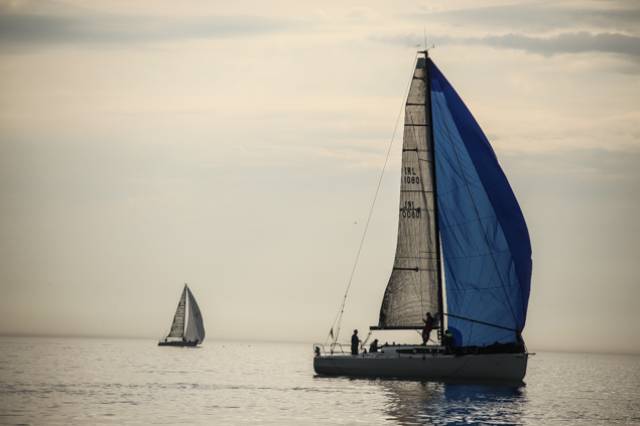Race 4 in ISORA’s Averycrest Offshore Series 2017 took place on Saturday 27th May with the J109 Indian skippered by Colm Buckley taking the IRC overall win in the race from Dun Laoghaire to Arklow reports Peter Ryan. From the original entry list of 36 boats, 28 confirmed starting. However six boats pulled out at the last minute.
For the week leading up to the race, the weather forecasts were predicting southerly winds. There was also extremely strong tides that day.
As the day of the race approached the different sources of weather forecast varied widely. Some were predicting northerly winds, some southerly and other westerly. In wind strength, the forecasts varied for 0-25 knots!! Rain and no rain was also forecast. The feeling was that there was going to be light conditions at the start anyway and the fleet would be punished by the exceptional tide while trying to make their way south.
This uncertain weather with the strong tides was a major factor in the reason why some boats pulled out.
Due to the conditions forecast the course was:
Start at Dun Laoghaire
Muglins (S)
South Arklow (S)
Finish in Arklow
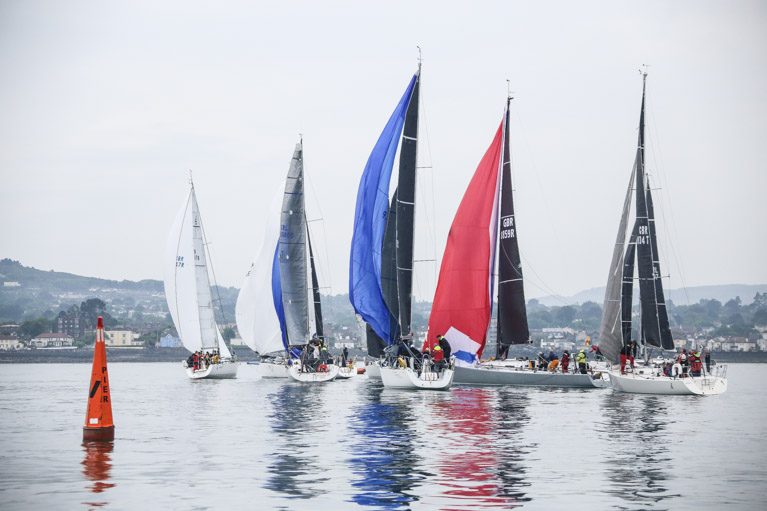 With seconds to the start gun, at least six boats in the 22–boat the fleet manage to be on the line, despite the absence of any wind and the presence of a strong flood tide pushing them back.....
With seconds to the start gun, at least six boats in the 22–boat the fleet manage to be on the line, despite the absence of any wind and the presence of a strong flood tide pushing them back.....
The start was provided by at DBSC Pier mark by Larry Power and Barry MacNeaney. Just prior to the race the weather readings from the Dublin Bay Buoy was 2-3 knots South West. In preparation of this start scenario, where the entire fleet would be pushed back from the line at the start and not able to cross it, The Sailing Committee decided to invoke the “ISORA starting protocol”. In this protocol the committee boat would stand down at 10 minutes after the start signal and after that, any boats that have not crossed the start line would leave the pin end to (P).
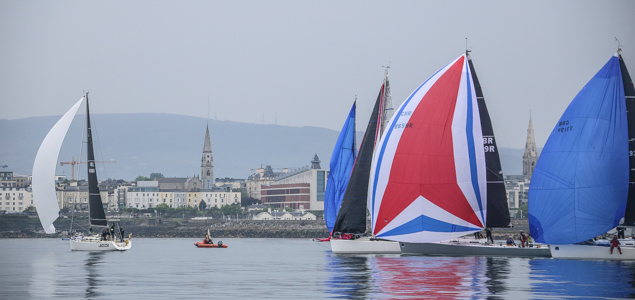 The Irish National Sailing School's JedI looks to have made the best start by far in the drifting conditions with spinnaker drawing nicely and to be two boat lengths clear in Scotsman's Bay but....
The Irish National Sailing School's JedI looks to have made the best start by far in the drifting conditions with spinnaker drawing nicely and to be two boat lengths clear in Scotsman's Bay but....
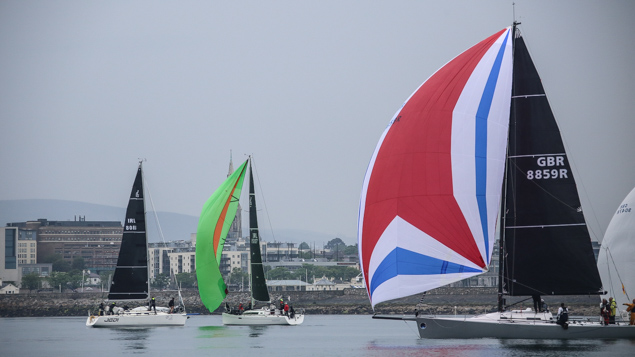 ...just moments later the kite is down on the sailing school entry as skipper Kenny Rumball heads back to the line to avoid a penatly for a premature start
...just moments later the kite is down on the sailing school entry as skipper Kenny Rumball heads back to the line to avoid a penatly for a premature start
Obviously the “Wind Gods” favour ISORA and Offshore Racing as they provided 5 knots westerly immediately before the start that was sufficient to propel the fleet under spinnaker towards the Muglins. However, even the Wind Gods can change their mind and the wind dropped soon after the start.
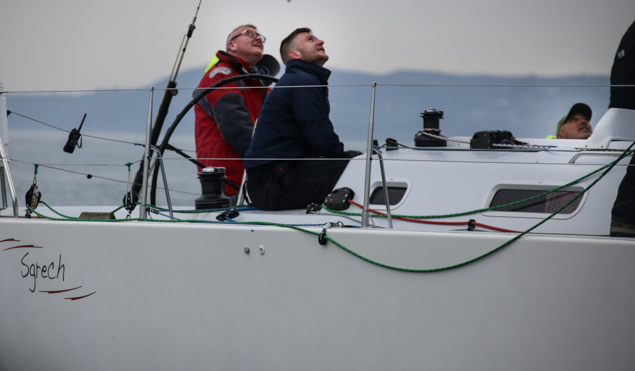 All eyes on sail trim on board Sgrech, the J109 entry from Pwllheli
All eyes on sail trim on board Sgrech, the J109 entry from Pwllheli
This drop in wind scattered the fleet, with some boats heading in towards land to get out of the foul tide while others hunted out to sea in search of zephyrs. It took over one and a half hours for the first boat to complete the 1.5 miles to the Muglins.
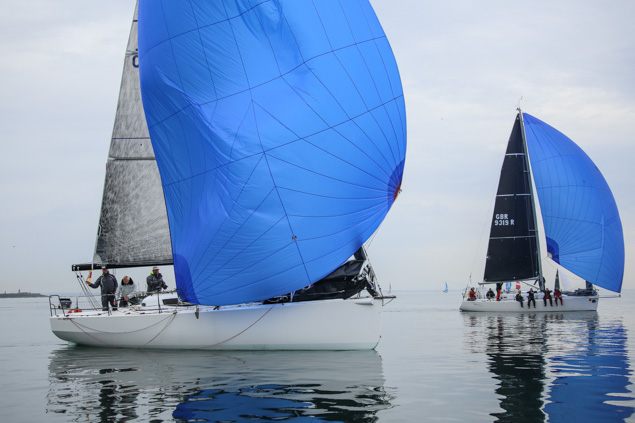 JPK10.80 Rockabill keeps her spinnaker filling in the very light winds off Dalkey – 44 miles to go!
JPK10.80 Rockabill keeps her spinnaker filling in the very light winds off Dalkey – 44 miles to go!
It was Andrew Halls’s “Jackknife” and Chris Power-Smith’s “Aurelia” who appeared to dominate the position at the Muglins. Paul O’Higgins “Rockabill VI” who had taken the land side appeared to be stalled against the land only to accelerate across Dalkey Sound and nudge in behind the leading boats.
At this stage the wind started to build to 5-7 knots northerly and just enough to allow most of the fleet to make progress south against the tide.
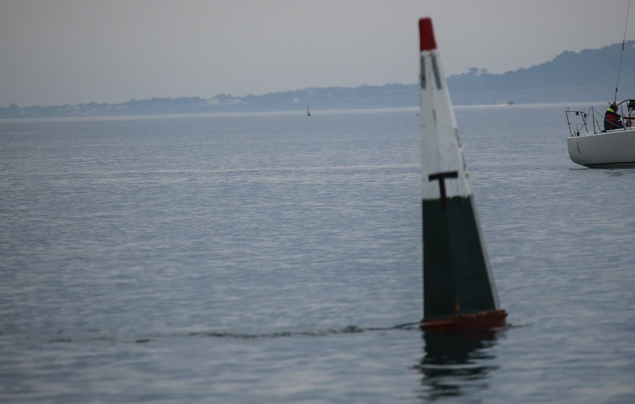 A two–knot flood tide meant the 22–boat fleet took an hour to exit Dublin Bay with Andrew Hall's Jackknife the first to reach the Muglins rock (below)
A two–knot flood tide meant the 22–boat fleet took an hour to exit Dublin Bay with Andrew Hall's Jackknife the first to reach the Muglins rock (below)
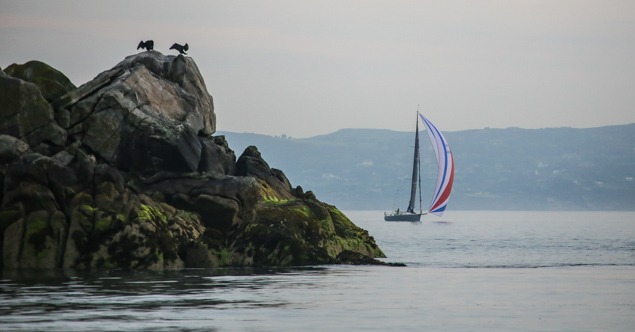
For such a huge tide, the tidal currents did not appear to be generally exceptional? As the fleet approached Wicklow Head the wind disappeared completely. Fortunately the tide had now started to ebb and was helping the fleet south. Despite no wind, the locally strong tides around Wicklow Head pushed the fleet south past the head at nearly 5.0 knots! Adding to the challenge of the race, torrential rain fell on the fleet around Wicklow.
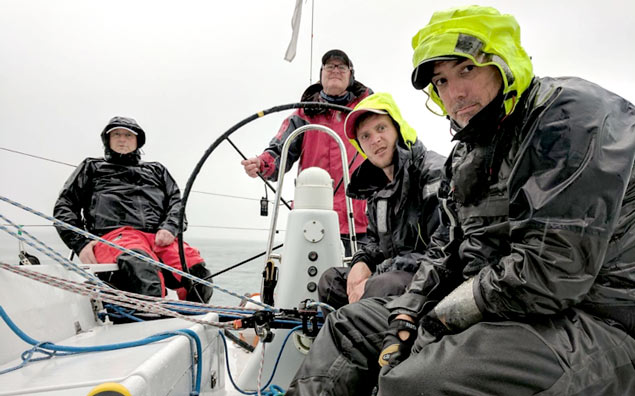 Peter Ryan, Stephen and Thomas Tudor and Andrew Rosewarne 'enjoying' the torrential rain onboard 'Sgrech'
Peter Ryan, Stephen and Thomas Tudor and Andrew Rosewarne 'enjoying' the torrential rain onboard 'Sgrech'
The next decision after passing Wicklow Head was what side of the Arklow Bank would boats go? The decision was mostly easily made as boats “found” themselves one side or the other in the slack winds.
The next twist came at the Arklow Bank when suddenly the wind appeared from the West and increased rapidly to 20-24 knots. The boats that had found themselves in at the shore were now reaching fast towards South Arklow while those outside the Arklow Bank were beating for the mark.
Again at the South Arklow buoy, the enormity of the south going tide was obvious as boats “crabbed” around the mark trying to avoid hitting it!!
The final 10 mile leg to the finish in Arklow was a fetch in the strong westerly winds. As the first boats finished, the tide had turned again assisting those boats towards the back of the fleet.
“Jackknife” took line honours will Colm Buckley’s J109 “Indian”, who had no YB tracker fitted, took IRC Overall and Class 1. Two more J109’s, Peter Dunlop’s “Mojito” and Roger Smith’s “Wakey Wakey” took 2nd and 3rd place IRC Overall and Class 1. Paul O’Higgings “Rockabill VI” took IRC Class 0 while Joe Conway’s “Elandra” took Class 2.
The new “ISORA Progressive ECHO” proved to work well with Brian Hett’s “Oystercatcher” taking ECHO Overall and Class 1 while “Elandra” took 2nd ECHO Overall and Class 2 and Grant Kinsman’s “Thalia” took ECHO 3rd Overall and Class 0.
The ISORA fleet had not been to Arklow before but they were met with a huge welcome from Mark Fallon, Commodore of Arklow Sailing Club and all the members there. The large numbers of tired sailors who made their way to the very comfortable Clubhouse were reward with a complimentary BBQ and some live music. All this ensured that another great ISORA Apres Sail took place.
The next race in the Series will be a unique event in that the ISORA Day race will incorporate two other events and have two finishes. Howth YC will provide a start to the ISORA fleet and send them around their Lambay Race course and provide a finish to the Lambay Race off Howth. The fleet will pass though that finish line and proceed to the ISORA race finish line, provided by Poolbeg Yacht & Boat Club, that will be located at the mouth of the Dublin Port channel. They are taking part in the Dublin Port Riverfest being organised by Dublin Port. Berthing facilities will be available for competing yachts so they can take part in this festival along the river. Separate entry will be required for the HYC Lambay Race and this can be made online. HYC will be awarding prizes for this part of the race.



























